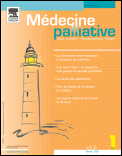
Medecine Palliative
Scope & Guideline
Advancing Palliative Practices for Better Patient Outcomes.
Introduction
Aims and Scopes
- Holistic Care Approaches:
Focuses on comprehensive treatment modalities that address not only the physical but also the emotional, social, and spiritual needs of patients and their families. - Ethical Decision-Making:
Explores the ethical dilemmas encountered in palliative care, including end-of-life decisions, euthanasia, and assisted suicide, while promoting dialogue among healthcare professionals. - Caregiver Support and Experience:
Examines the experiences and emotional challenges faced by caregivers, highlighting the importance of their role in the palliative care process. - Research and Evidence-Based Practices:
Encourages the dissemination of research findings that inform best practices in palliative care, including pilot studies and randomized controlled trials. - Interdisciplinary Collaboration:
Promotes teamwork among various healthcare professionals, including physicians, nurses, psychologists, and social workers, to enhance patient care and decision-making processes. - Cultural and Societal Perspectives:
Investigates how cultural beliefs and societal norms impact palliative care practices and patient experiences, particularly in diverse populations.
Trending and Emerging
- Emotional and Psychological Aspects of Care:
An increased emphasis on understanding the emotional experiences of both patients and caregivers during the palliative process, indicating a recognition of mental health's critical role in end-of-life care. - Ethical Challenges in End-of-Life Decisions:
A surge in discussions surrounding ethical dilemmas, such as assisted dying and decision-making processes, reflecting societal changes and a greater acceptance of these topics in public discourse. - Integration of Palliative Care in Various Settings:
A trend towards studying the integration of palliative care in diverse healthcare environments, including home care, pediatrics, and intensive care, suggesting a broader application of palliative principles. - Research on Caregiver Dynamics:
Growing interest in the roles, challenges, and support systems for caregivers, highlighting their centrality in the palliative care framework and the need for targeted interventions. - Cultural Competence in Palliative Care:
An emerging focus on understanding how cultural contexts influence palliative care practices, emphasizing the importance of culturally sensitive approaches to improve patient outcomes.
Declining or Waning
- Traditional Medical Interventions:
There is a noticeable decrease in studies focusing solely on conventional medical treatments without considering holistic or integrative approaches, as the field moves towards more comprehensive care models. - Pediatric Palliative Care Techniques:
Research specifically centered on technical aspects of pediatric palliative care seems to be less frequent, indicating a shift towards broader psychosocial and ethical discussions rather than just clinical techniques. - Historical Analyses of Palliative Care:
Fewer papers appear to focus on historical perspectives or retrospective analyses of palliative care practices, suggesting a move towards contemporary issues and innovations.
Similar Journals
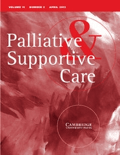
Palliative & Supportive Care
Advancing the Art of Compassionate CarePalliative & Supportive Care, published by Cambridge University Press, is a pivotal journal dedicated to advancing research and practice in the fields of palliative care, supportive care, and the psychological aspects of terminal and chronic illness. With a robust ISSN of 1478-9515 and an E-ISSN of 1478-9523, this esteemed journal has established itself as a vital resource for professionals, researchers, and students who are committed to improving the quality of life for patients facing serious health challenges. Featuring peer-reviewed articles that span clinical psychology, medicine, nursing, and psychiatry, it holds a respectable impact factor, ranking Q2 in Clinical Psychology, Medicine, and Nursing as per the 2023 category quartiles. The journal is based in the United Kingdom and has been contributing to the field since its inception in 2003. Although it currently does not offer Open Access, its rigorously curated content underscores its relevance and importance in facilitating interdisciplinary dialogue and innovation in palliative and supportive care. For those seeking to stay at the forefront of research, Palliative & Supportive Care remains an indispensable platform for scholarly communication and discovery.
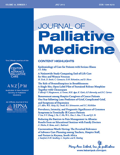
JOURNAL OF PALLIATIVE MEDICINE
Fostering excellence in end-of-life care through impactful research.Welcome to the Journal of Palliative Medicine, a distinguished peer-reviewed publication dedicated to advancing the field of palliative care. Published by Mary Ann Liebert, Inc., this journal serves as a vital resource for researchers, healthcare professionals, and students in the disciplines of anesthesiology, nursing, and general medicine. With an impressive track record since its inception in 1998, the journal has achieved Q1 status in both Anesthesiology and Pain Medicine, as well as in Nursing (Miscellaneous), reflecting its scholarly impact within the academic community. The impact factor and rank underscore its significance, with the journal positioned at the 75th percentile in General Nursing and the 65th percentile in Anesthesiology and Pain Medicine according to Scopus rankings. Though the journal follows a subscription model, it remains committed to disseminating critical research that improves patient care and quality of life for those facing serious illnesses. As the field continues to evolve, the Journal of Palliative Medicine remains a cornerstone for fostering innovation and education in palliative practices, underscoring the importance of compassionate care.

BMC Medical Ethics
Fostering collaboration on critical healthcare issues.BMC Medical Ethics is a leading open-access journal dedicated to the critical exploration and dissemination of knowledge surrounding ethical issues in healthcare and medicine. Published by BMC, and headquartered in the United Kingdom, this journal has become a cornerstone in the field since its inception in 2000, with a remarkable focus on health policy, nursing ethics, and the complex legal aspects intertwining with healthcare practices. With an impressive Q1 ranking across multiple categories, including Health Policy and Health (Social Science), it ranks among the top journals globally—particularly notable with its Scopus rankings reflecting a strong 85th percentile in Nursing and an 81st percentile in Social Sciences. As an open-access publication, BMC Medical Ethics ensures that research findings are readily accessible, fostering a collaborative environment for researchers, practitioners, and students alike. The journal's commitment to ethical discourse not only advances academic inquiry but also shapes the practices and policies that govern healthcare delivery; thus, making it an invaluable resource for those engaged in the advancement of medical ethics.

Journal of Hospice & Palliative Nursing
Empowering Care, Enhancing Lives.The Journal of Hospice & Palliative Nursing (ISSN: 1522-2179, E-ISSN: 1539-0705), published by Lippincott Williams & Wilkins, stands as a leading resource in the field of hospice and palliative care nursing. With an impressive impact factor and ranked in the Q1 quartile for Advanced and Specialized Nursing and Q2 quartile for Community and Home Care as of 2023, this journal serves as a critical platform for disseminating evidence-based practices and innovative research. It covers a broad spectrum of topics, aiming to improve patient experiences and enhance the quality of care for individuals with life-limiting conditions. Created to support healthcare professionals, researchers, and students in the United States and beyond, the journal invites contributions that stimulate scholarly dialogue and advance the practice of palliative nursing. With publication years converging from 1999 to 2024, it remains an invaluable asset to the nursing community, fostering advancements in this vital area of healthcare.
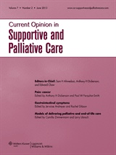
Current Opinion in Supportive and Palliative Care
Exploring innovative strategies for critical patient needs.Current Opinion in Supportive and Palliative Care, an esteemed journal published by Lippincott Williams & Wilkins, provides a vital platform for the dissemination of contemporary research and expert perspectives in the fields of supportive and palliative care. As part of the medical community's growing focus on critical care and oncology, this journal has earned its place in the Q2 category across multiple rankings, reflecting its influence and significance in advancing knowledge and practices. With its ISSN 1751-4258 and E-ISSN 1751-4266, it covers literature from 2007 to 2024, making it a reliable resource for the latest developments. While it does not offer open access, the journal ensures careful curating of high-quality articles, fostering a deeper understanding of complex care needs. Researchers, clinicians, and students alike will benefit from the journal's insights, exploring innovative strategies and multidisciplinary approaches to improve patient outcomes in critical situations. The commitment to such a crucial area of healthcare underscores the importance of this publication in shaping future practices and policies.
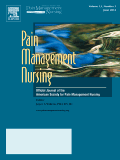
Pain Management Nursing
Transforming Pain Management Through Research and InsightPain Management Nursing is a premier journal dedicated to advancing the field of pain management through rigorous research and practical insights. Published by Elsevier Science Inc., this esteemed journal holds a Q1 ranking in Advanced and Specialized Nursing as of 2023, highlighting its significance in the academic and clinical nursing community. With an impressive Scopus rank of #11 out of 63 in its category, Pain Management Nursing presents a platform for researchers, clinicians, and educators to disseminate and access high-quality articles focused on pain assessment, treatment modalities, and evidence-based practice. The journal is published in the United States and covers a wide array of topics from innovative pain management strategies to interdisciplinary approaches. By fostering critical discourse and facilitating knowledge exchange, this journal plays a vital role in improving patient outcomes in pain management. Be part of this influential publication's journey from 2000 through 2024, as it continues to shape the future of nursing in this essential specialization.
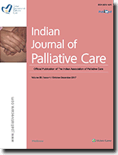
Indian Journal of Palliative Care
Advancing the discourse in palliative care and health policy.Indian Journal of Palliative Care is a premier peer-reviewed publication dedicated to advancing the field of palliative care within the broader domains of health policy and public health. Published by SCIENTIFIC SCHOLAR LLC in India since 2003, this Open Access journal is committed to providing a platform for innovative research and practices that promote quality of life for patients with life-limiting illnesses. With a focus on health policy and environmental and occupational health, the journal holds a respected position in the Q3 quartile for both categories, reflecting its significant contributions to scholarly discourse. Ranked #393 in Public Health and #185 in Health Policy according to Scopus, it serves as an essential resource for researchers, professionals, and students seeking to deepen their understanding of palliative care and its implications within public policy and health frameworks. Through its rigorous editorial standards and broad accessibility, the Indian Journal of Palliative Care plays a vital role in shaping effective solutions and policies that aim to enhance patient care and well-being.
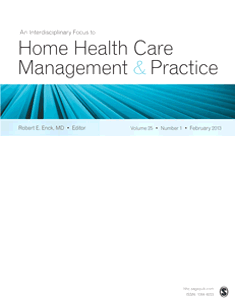
Home Health Care Management and Practice
Advancing Excellence in Home Health Care ManagementHome Health Care Management and Practice, published by SAGE Publications Inc., is an esteemed journal dedicated to advancing the field of home health care management through rigorous research and thought-provoking commentary. Established in 1988, this scholarly publication has become a critical resource for professionals, researchers, and students interested in the dynamics of community care and home health services. With an impact that reflects its commitment to quality, the journal holds an impressive standing, achieving a Q2 ranking in Community and Home Care and a Q3 ranking in both Leadership and Management and Public Health, as of 2023. The journal operates without open access, ensuring that its contributions are housed within an esteemed academic framework. Covering key areas such as nursing, leadership strategies, and occupational health, it serves as an essential platform for disseminating knowledge, fostering collaboration, and influencing best practices in the field. The journal's targeted focus empowers its readers to stay at the forefront of emerging trends and evidence-based practices, making it a vital asset for anyone involved in the evolving landscape of home health care.
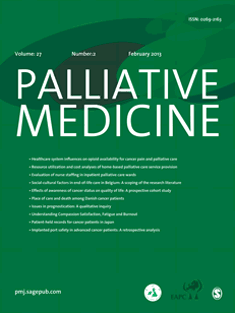
PALLIATIVE MEDICINE
Enhancing Lives Through Palliative ExpertisePalliative Medicine is a premier journal dedicated to advancing the field of palliative care, published by SAGE Publications Ltd. Established in 1987 and continuing through 2024, this esteemed journal focuses on the integration of pain management and comprehensive care for patients with life-limiting illnesses. With its impressive impact factor and a prestigious Q1 ranking in both Anesthesiology and Pain Medicine, as well as in Medicine (miscellaneous), it stands as a critical resource for researchers, healthcare professionals, and students engaged in this vital area of medicine. The journal emphasizes original research, reviews, and clinical studies that contribute to the understanding and practice of palliative care, promoting improved quality of life and support for patients and their families. Although not open access, articles are accessible through institutional subscriptions, ensuring the dissemination of knowledge to a wide audience. Whether you are a seasoned researcher or an emerging professional in the field, Palliative Medicine remains an invaluable platform for scholarly exchange and innovation.

SUPPORTIVE CARE IN CANCER
Bridging research and practice for better patient outcomes.SUPPORTIVE CARE IN CANCER is a premier academic journal published by Springer, dedicated to advancing the understanding and management of supportive care for cancer patients. With a notable impact factor, the journal is recognized for its contribution to the fields of Oncology, Rehabilitation, and Nursing, achieving impressive rankings in Scopus, including Q1 for Oncology Nursing and Rehabilitation, and Q2 for general Oncology. Founded in 1993 and looking towards a promising future until 2024, it serves as a vital resource for researchers, professionals, and students engaged in these critical areas of healthcare. Although not an Open Access journal, its rigorous peer-reviewed articles provide valuable insights into innovative practices and evidence-based strategies that enhance patient quality of life during and after treatment. By bridging the gap between research and clinical practice, SUPPORTIVE CARE IN CANCER significantly influences patient outcomes and fosters interdisciplinary collaboration in patient support.